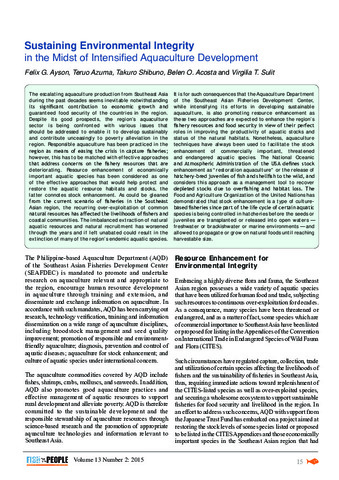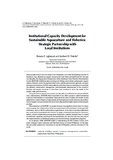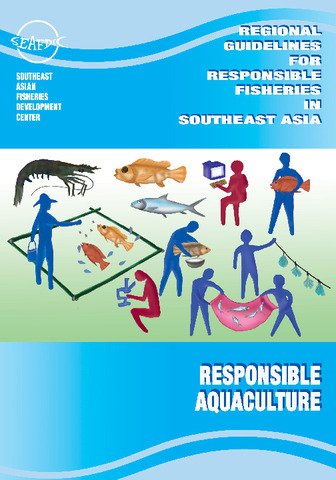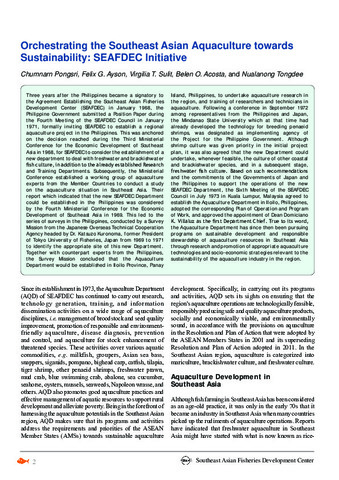Sustaining environmental integrity in the midst of intensified aquaculture development
- Global styles
- MLA
- Vancouver
- Elsevier - Harvard
- APA
- Help
Share
Abstract
The escalating aquaculture production from Southeast Asia during the past decades seems inevitable notwithstanding its significant contribution to economic growth and guaranteed food security of the countries in the region. Despite its good prospects, the region’s aquaculture sector is being confronted with various issues that should be addressed to enable it to develop sustainably and contribute unceasingly to poverty alleviation in the region. Responsible aquaculture has been practiced in the region as means of easing the crisis in capture fisheries; however, this has to be matched with effective approaches that address concerns on the fishery resources that are deteriorating. Resource enhancement of economically important aquatic species has been considered as one of the effective approaches that would help protect and restore the aquatic resource habitats and stocks, the latter connotes stock enhancement. As could be gleaned from the current scenario of fisheries in the Southeast Asian region, the recurring over-exploitation of common natural resources has affected the livelihoods of fishers and coastal communities. The imbalanced extraction of natural aquatic resources and natural recruitment has worsened through the years and if left unabated could result in the extinction of many of the region’s endemic aquatic species. It is for such consequences that the Aquaculture Department of the Southeast Asian Fisheries Development Center, while intensifying its efforts in developing sustainable aquaculture, is also promoting resource enhancement as these two approaches are expected to enhance the region’s fishery resources and food security in view of their perfect roles in improving the productivity of aquatic stocks and status of the natural habitats. Nonetheless, aquaculture techniques have always been used to facilitate the stock enhancement of commercially important, threatened and endangered aquatic species. The National Oceanic and Atmospheric Administration of the USA defines stock enhancement as “restoration aquaculture” or the release of hatchery-bred juveniles of fish and shellfish to the wild, and considers this approach as a management tool to recover depleted stocks due to overfishing and habitat loss. The Food and Agriculture Organization of the United Nations has demonstrated that stock enhancement is a type of culture based fisheries since part of the life cycle of certain aquatic species is being controlled in hatcheries before the seeds or juveniles are transplanted or released into open waters — freshwater or brackishwater or marine environments — and allowed to propagate or grow on natural foods until reaching harvestable size.
Suggested Citation
Ayson, F. G., Azuma, T., Shibuno, T., Acosta, B. O., & Sulit, V. T. (2015). Sustaining environmental integrity in the midst of intensified aquaculture development. Fish for the People , 13(2), 15-22. http://hdl.handle.net/20.500.12066/965
Type
magazineArticleISSN
1685-6546Collections
- Fish for the People [41]
Related items
Showing items related by title, author, creator and subject.
-
Institutional capacity development for sustainable aquaculture and fisheries: Strategic partnership with local institutions
Agbayani, Renato F.; Toledo, Joebert D. (Terrapub, 2008)Many people living in the rural areas in the Philippines, as in other developing countries in Southeast Asia, depend on aquatic resources for their food and livelihood. For the past two decades, the Aquaculture Department ... -
Regional guidelines for responsible fisheries in Southeast Asia: Responsible aquaculture
This 43-page guidebook presents the code of conduct that has been re-written, expanded, clarified and annotated with definitions and examples to consider the fish farming industries in Southeast Asia. The source of the ... -
Orchestrating the southeast Asian aquaculture towards sustainability: SEAFDEC initiative
Pongsri, Chumnarn; Ayson, Felix G.; Sulit, Virgilia T.; Acosta, Belen O.; Tongdee, Nualanong (Secretariat, Southeast Asian Fisheries Development Center, 2015)Three years after the Philippines became a signatory to the Agreement Establishing the Southeast Asian Fisheries Development Center (SEAFDEC) in January 1968, the Philippine Government submitted a Position Paper during the ...







